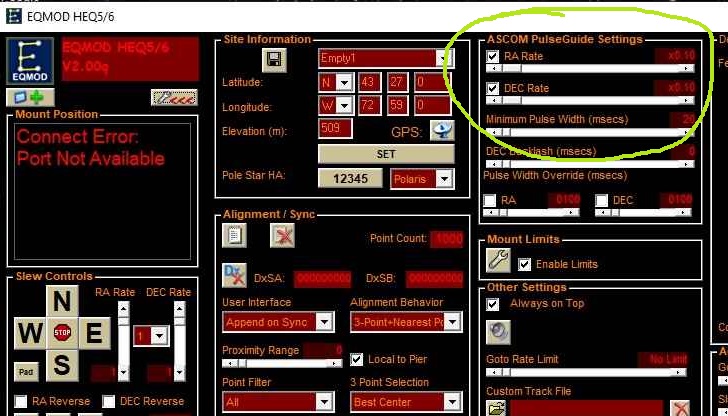PHD2 fails to calibrate after meridian flip
Richard Thomas
mj.w...@gmail.com

Michael
Brian Valente
--
You received this message because you are subscribed to the Google Groups "Open PHD Guiding" group.
To unsubscribe from this group and stop receiving emails from it, send an email to open-phd-guidi...@googlegroups.com.
To view this discussion on the web visit https://groups.google.com/d/msgid/open-phd-guiding/23d540ac-627a-41e3-82ba-7ac71c5c54d8n%40googlegroups.com.
bw_m...@earthlink.net
Hi Richard. I think you need to go back to the original problem, which is why the guiding got worse after a meridian flip. Looking at the calibration failure, it looks like the mount behaved very badly with the first “west” calibration step after the meridian flip, moving so far that the guide star was lost. I think you need to trouble-shoot this manually, not running NINA and not trying to do an automated imaging session. As Michael said, you should first fix the guide speeds in EQMOD which are absurdly low – I’m surprised you were able to get anything done with these settings. Get the mount guide speed settings up above 0.5x sidereal. Then create a new PHD2 profile using the new-profile-wizard and specifying the correct guide speed. None of this will fix the current problem but it will help get things back where they should be from a software perspective.
Once you’ve done this and gotten a reasonable calibration, you should position the scope on the west side of the pier, pointing at Dec = 44 degrees. Then force a meridian flip so the scope is on the east side of the pier still pointing at Dec = 44. Look very, very carefully to see if there are cables binding or pulling, anything that interferes with the ability of the mount to move smoothly. With such slow guide speeds, the setup was especially vulnerable to these things. I think cable routing is the most likely source of the problem, those issues often show up after a meridian flip. Don’t start fooling around with software settings like “Reverse Dec output”, those have nothing to do with the problem and will just take you down a blind alley.
Good luck,
Bruce
--
Richard Thomas
- Cables aren't an issue. The only ones which dangle are the EQDIR and 12V power cable, but they are long enough to not snag, bind etc.
- I've now updated Guide rate for RA and DEC in EQMOD to x0.50 and created a new PHD2 profile
- I tried the Meridian calibrate tool which highlighted an issue
- WEST side of pier calibration worked fine
- EAST side of pier calibration would not slew back to required coordinates (RA = meridian and DEC = 0 degrees). I had to disable mount limits to complete the slew and calibration worked fine
- Note: I have set up mount limits to avoid collision between my imaging camera and tripod legs
